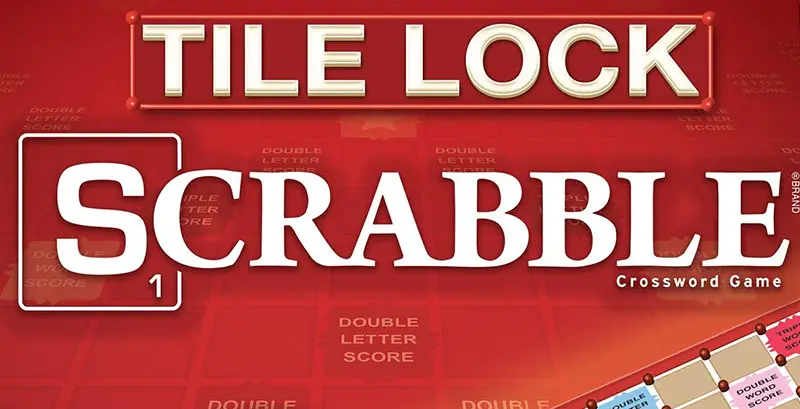
The clever "tile lock" system on this gameboard keeps your tiles in place when you move or tilt it. And the smaller tiles, racks and board make the game perfect for Scrabble fun ot the run!
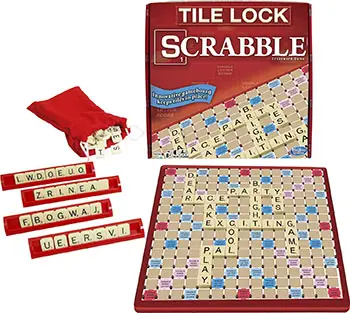
Components
- Gameboard
- 100 letter tiles
- 4 letter tile racks
- tile storage bag
- Instructions
Object of the Game
In the SCRABBLE game, players form interlocking words, crossword fashion, on the board using letter tiles of different values.
Each player competes for high score by taking advantage of the letter tiles, as well as the premium squares on the board. In a 2-player game, a good player will score in the 300-400 point range.
Setup
Place all letter tiles in the bag, or facedown beside the board, and mix them up. Draw for first play. The player with the letter closest to "A" plays first (a blank tile beats any letter).
Return the letters to the pool and remix. All players draw seven new letters each and place them in their racks. Prepare a scoresheet with the name of each player along the top.
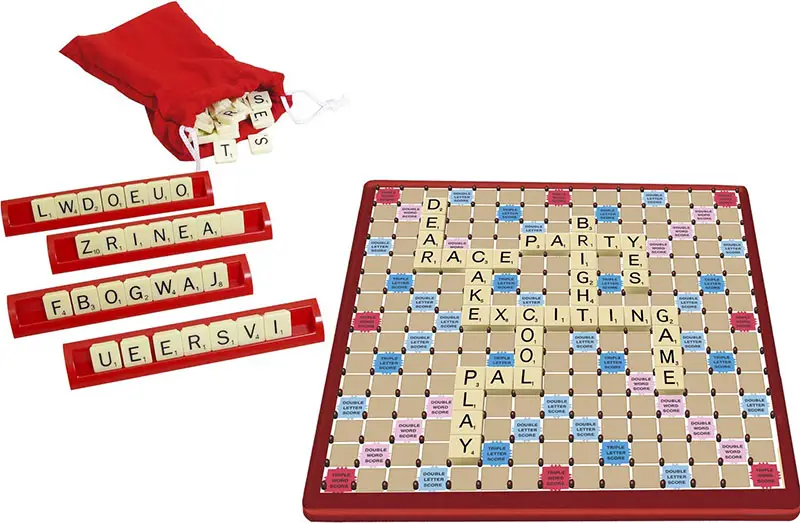
Game Play
-
The first player combines two or more of his or her letters to form a word, and places the word on the board to read either across or down with one letter on the center H square. Diagonal words are not allowed.
-
Complete your turn by counting and announcing the score for that turn, which the scorekeeper records.
Then draw as many new letters as you played, always keeping seven letters on your rack, as long as there are enough left in the bag.
-
Play passes to the left. The second player, and then each in turn, adds one or more letters to those already played to form new words.
All letters played on a turn must be placed in one row across or down the board to form at least one complete word.
If, at the same time, they touch other letters in adjacent rows, those must form complete words, crossword fashion, with all such letters. The player gets credit for all words formed or modified on his or her turn.
-
New words may be formed by:
-
Adding one or more letters to a word or letters already on the board.
-
Placing a word at right angles to a word already on the board. The new word must use one of the letters already on the board or must add a letter to it.
-
Placing a complete word parallel to a word already played so the adjacent letters also form complete words. (See Turn 5 in example).
-
-
No tile may be shifted or replaced after it has been played and scored.
-
Blanks: The two blank tiles may be used as any letters. When playing a blank, you must state which letter it represents. It remains that letter for the rest of the game.
-
You may use a turn to exchange all or some of your letters. To do this, place your discarded letter(s) facedown. Draw the same number of letters from the pool, then mix your discarded letter(s) into the pool. This ends your turn.
-
Before the game begins, players should agree which dictionary they will use, in case of a challenge.
All words labeled as a part of speech (including those listed of foreign origin, and as archaic, obsolete, colloquial, slang, etc). are permitted with the exception of the following: words always capitalized, abbreviations, prefixes and suffixes standing alone, words requiring a hyphen or an apostrophe.
Any play may be challenged before the next player starts a turn. If the play challenged is unacceptable, the challenged player takes back his or her tiles and loses that turn.
If the play challenged is acceptable, the challenger loses his or her next turn. All words (not just one) made in one play are challenged simultaneously. If any word is unacceptable, the entire play is unacceptable. Only one turn is lost on any challenge.
Consult the dictionary for challenges only.
Scrabble Letter Tile Distribution
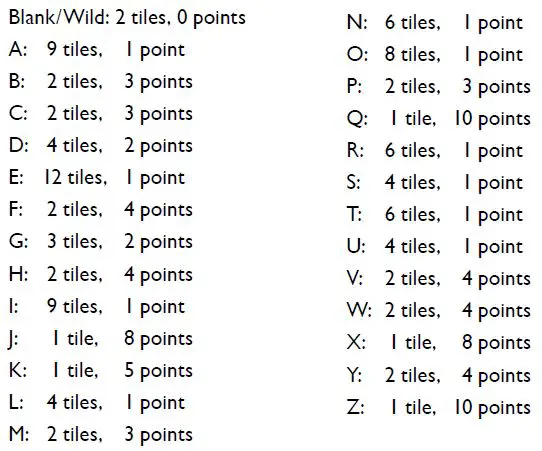
End of the Game
The game ends when all letters have been drawn and one player uses his or her last letter, or when all possible plays have been made.
Scoring
-
The scorekeeper tallies each player's score, entering it after each turn. The score value of each letter is indicated by a number at the bottom of the tile. The score value of a blank is zero.
-
The score for each turn is the sum of the letter values in each word(s) formed or modified on that turn, plus the additional points obtained from placing letters on premium squares.
-
Premium Letter Squares: A blue square doubles the score of a letter placed on it; a green square triples the letter score.
-
Premium Word Squares: The score for an entire word is doubled when one of its letters is placed on a red square; it is tripled when one of its letters is placed on an orange square. Include premiums for double or triple letter values, if any, before doubling or tripling the word score.
If a word covers two premium word squares, the score is doubled and then re-doubled (4 times the letter count), or tripled and then re-tripled (9 times the letter count).
Note: The center ★ square is a red square, which doubles the score for the first word.
-
Letter and word premiums count only on the turn in which they are played. On later turns, letters already played on premium squares count at face value.
-
When a blank tile is played on a red or orange square, the value of the word is doubled or tripled, even though the blank itself has no score value.
-
When two or more words are formed in the same play, each is scored. The common letter is counted (with full premium value, if any) for each word. (See Turns 3, 4 and 5 in example).
-
BINGO! If you play seven tiles on a turn, it's a Bingo. You score a bonus of 50 points after totaling your score for the turn.
-
Unplayed Letters: When the game ends, each player's score is reduced by the sum of his or her unplayed letters. In addition, if a player used all his or her letters, the sum of the other players' unplayed letters is added to that player's score.
The player with the highest final score wins the game.
In case of a tie, the player with the highest score before adding or deducting unplayed letters wins. If the tie still exists, the victory is shared.
Examples of word formation and scoring: In the following examples, the words or letters added on five successive turns are shown in bold type.
The scores shown reflect the letter R being on the center Hsquare. In Turn 1, count HORN: in Turn 2, FARM; in Turn 3, PASTE and FARMS; in Turn 4, MOB, NOT and BE; in Turn 5, BIT, PI and AT.
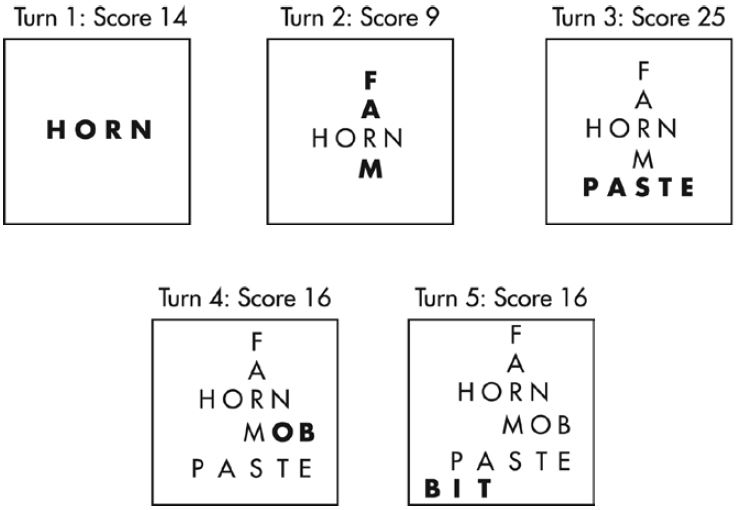
Rules for a Shorter Game
For a faster game than standard Scrabble, try 9-Tile Scrabble.
This variant is identical to the original game except players have 9 tiles on their racks instead of the usual 7.
You score a 50-point Bingo bonus for using 7, 8, or all 9 tiles on your rack.
Continue Reading


